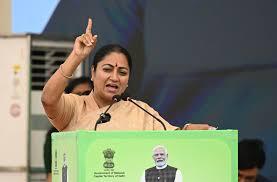New Delhi – Delhi Chief Minister Rekha Gupta has made an urgent appeal to Lieutenant Governor VK Saxena to fast-track the long-delayed Delhi Master Plan 2041, emphasizing the critical need to address current development challenges while preparing for future generations. The Delhi Master Plan 2041 draft was completed nearly three years ago but remains pending approval, creating uncertainty for the capital’s urban development trajectory.
During the inauguration of multiple development projects on Wednesday, Gupta stressed that the Delhi Master Plan 2041 should provide comprehensive solutions benefiting upcoming generations for the next century. She revealed that the plan was discussed in one of her first meetings after taking charge, with proposed changes already under review.
Comprehensive Rural Development Initiative Launched

The Chief Minister, alongside Lieutenant Governor Saxena, inaugurated 81 development projects across 50 villages under the ambitious Dilli Gramodaya Abhiyan (DGA). This massive initiative demonstrates the government’s commitment to rural development while the Delhi Master Plan 2041 remains under consideration.
These projects, launched from Pooth Khurd in Rohini, encompass a wide range of infrastructure improvements including community hall renovations, chaupals, parks, and multipurpose centres. The initiative addresses the historical neglect of Delhi’s rural areas, with officials confirming that projects span five zones: 16 in Dwarka, 10 in East Delhi, 13 in Narela, 20 in the North Zone, and 22 in Rohini.
Ladli Scheme Revival Marks Significant Policy Shift


In a major policy announcement, Gupta revealed that the Delhi government will credit honorarium to nearly 40,000 beneficiaries under the revived Ladli scheme on October 1. This marks the return of the Sheila Dikshit-era programme after more than a decade of discontinuation, demonstrating the administration’s commitment to women’s empowerment while awaiting the Delhi Master Plan 2041 implementation.
The Ladli scheme, originally launched on January 1, 2008, provides crucial financial support for girls born in Delhi through strategic term deposits. The programme offers ₹11,000 for institutional births, ₹10,000 for home births, and ₹5,000 at key educational milestones including entry into Classes 1, 2, 6, 9, and 10.
Massive Infrastructure Investment Under DGA Framework
The Dilli Gramodaya Abhiyan represents a significant shift in rural development approach, with ₹960 crore transferred from unused state allocations to the Delhi Development Authority (DDA). Since its December 2023 launch, 854 projects worth ₹760 crore have been sanctioned, with 156 currently under execution.
Also Read: Rekha Gupta Speed Trials: Bold Move to Clear Delhi’s 17,000 Pending Cases
Gupta emphasized that this initiative addresses years of neglect in rural areas while the Delhi Master Plan 2041 awaits finalization. The projects include open-air gym parks in Old Seemapuri and Karala, rural road upgrades, and civic infrastructure improvements in villages such as Bhalaswa, Holambi Khurd, Ghoga, Sannoth, Bankner, and Mohammadpur Majri.
Modern Sports Infrastructure Development
The Chief Minister inaugurated a state-of-the-art sports complex at CM Shri School in Hiran Kudna village, Outer Delhi, built at ₹3.5 crore. This facility exemplifies the type of forward-thinking infrastructure that the Delhi Master Plan 2041 should incorporate for comprehensive development.
The complex features a 200-metre, five-lane synthetic athletics track with a 100-metre sprint section, facilities for various field events including long jump, triple jump, high jump, shot put, and discus throw, plus a multipurpose turf for handball and other sports. This investment aligns with the government’s allocation of nearly ₹20,000 crore from the state’s ₹1 lakh crore budget to education, particularly focusing on sports infrastructure in villages and schools.
Electric Vehicle Infrastructure Expansion
Gupta, accompanied by Transport Minister Pankaj Singh and Power Minister Ashish Sood, inaugurated six modern switching sub-stations to strengthen Delhi’s electric bus charging network. This sustainable transport initiative demonstrates the kind of environmental considerations that the Delhi Master Plan 2041 should prioritize.
Five sub-stations developed by BSES Rajdhani Power Limited at Peeragarhi, Nangloi, Ambedkar Nagar, Srinivaspuri, and Okhla Central Workshop will provide charging for 970 electric buses. Additionally, a sixth facility built by Tata Power Delhi Distribution Ltd in Narela will cater to 200 buses, collectively supporting 1,170 electric buses.
Future Vision and Implementation Strategy


The Chief Minister’s emphasis on expediting the Delhi Master Plan 2041 reflects growing urgency around comprehensive urban planning. She stressed that the new master plan must address present development challenges while providing solutions for the next 100 years, indicating the document’s crucial role in shaping Delhi’s future.
The integration of rural development projects, educational infrastructure, sustainable transport, and women’s empowerment schemes demonstrates a holistic approach to governance that the Delhi Master Plan 2041 should incorporate. As proposed changes undergo review, the successful implementation of current initiatives provides a foundation for the comprehensive urban planning document that will guide Delhi’s development trajectory through 2041 and beyond.

